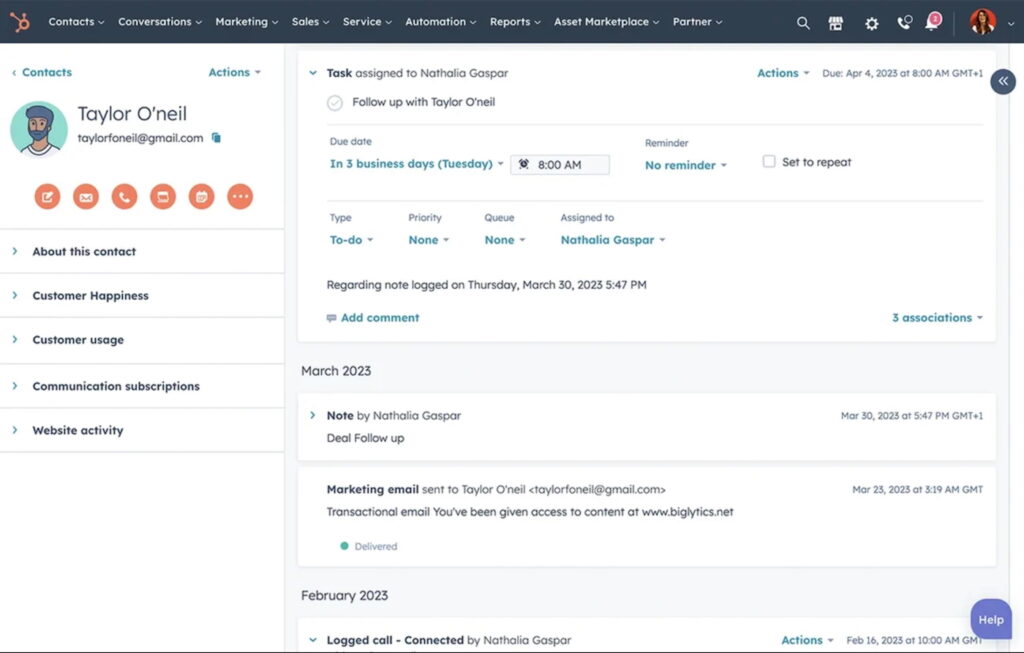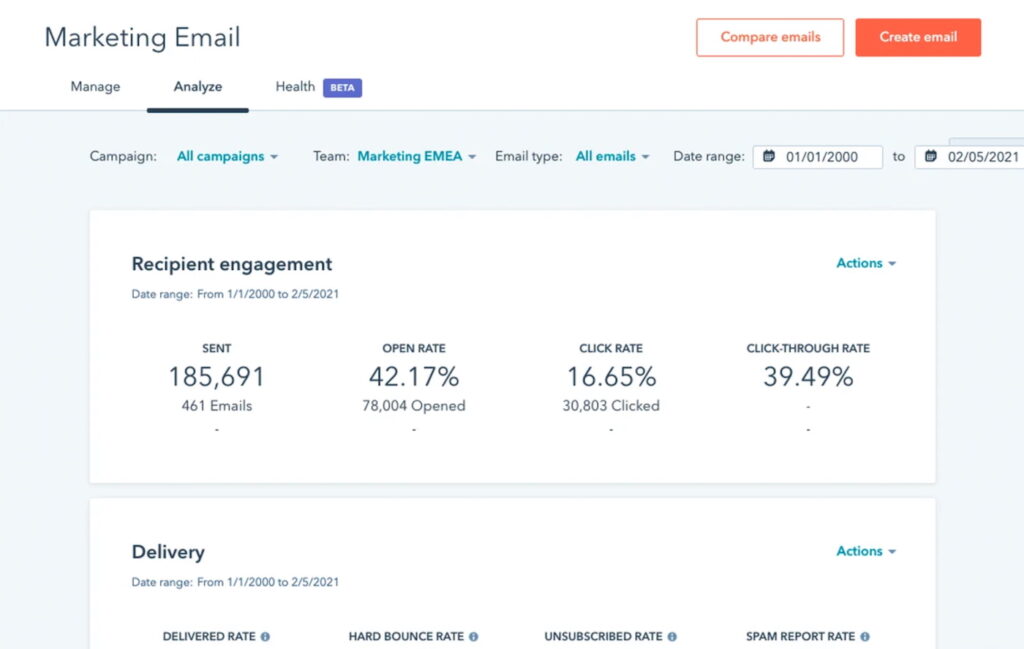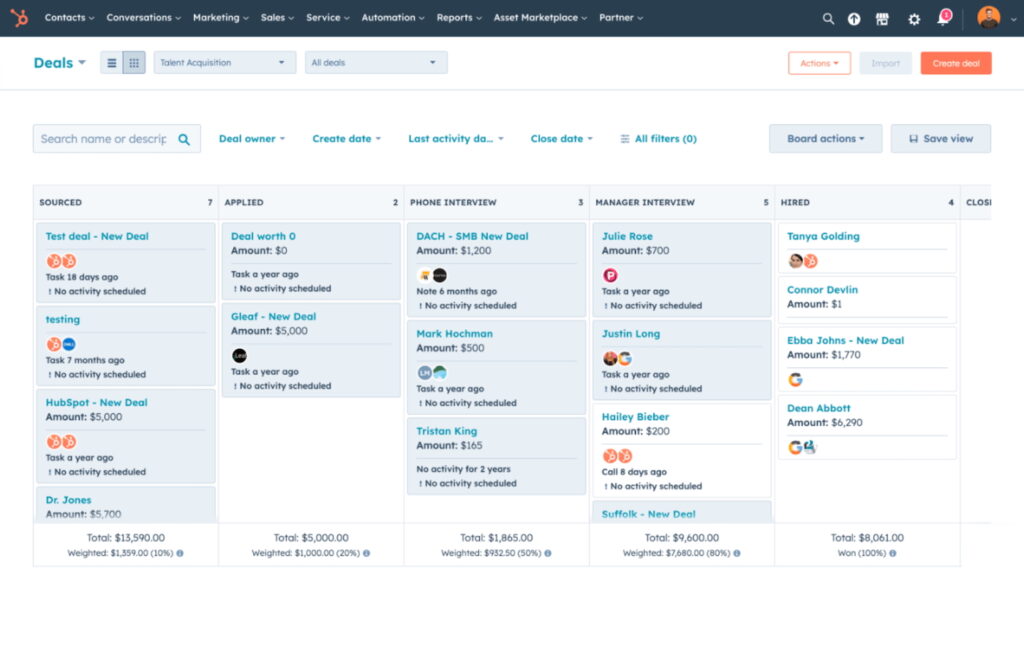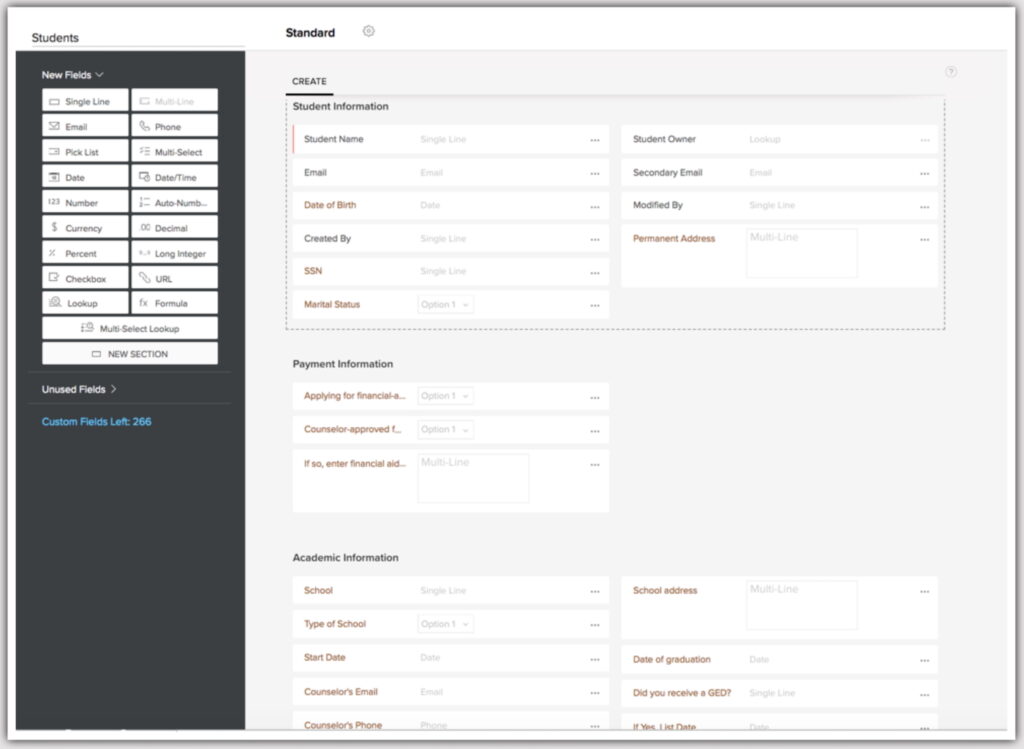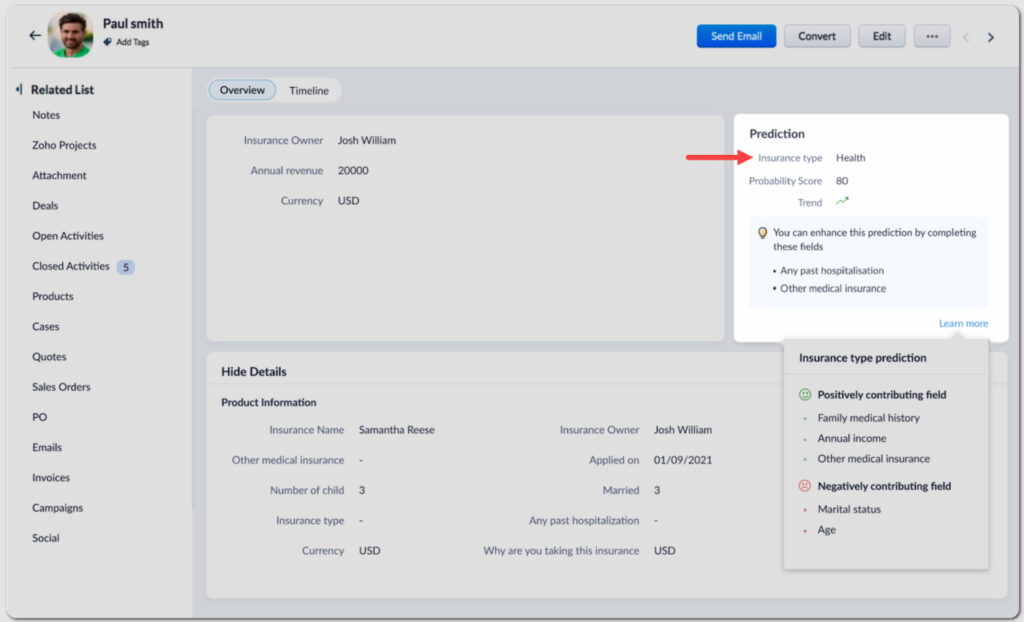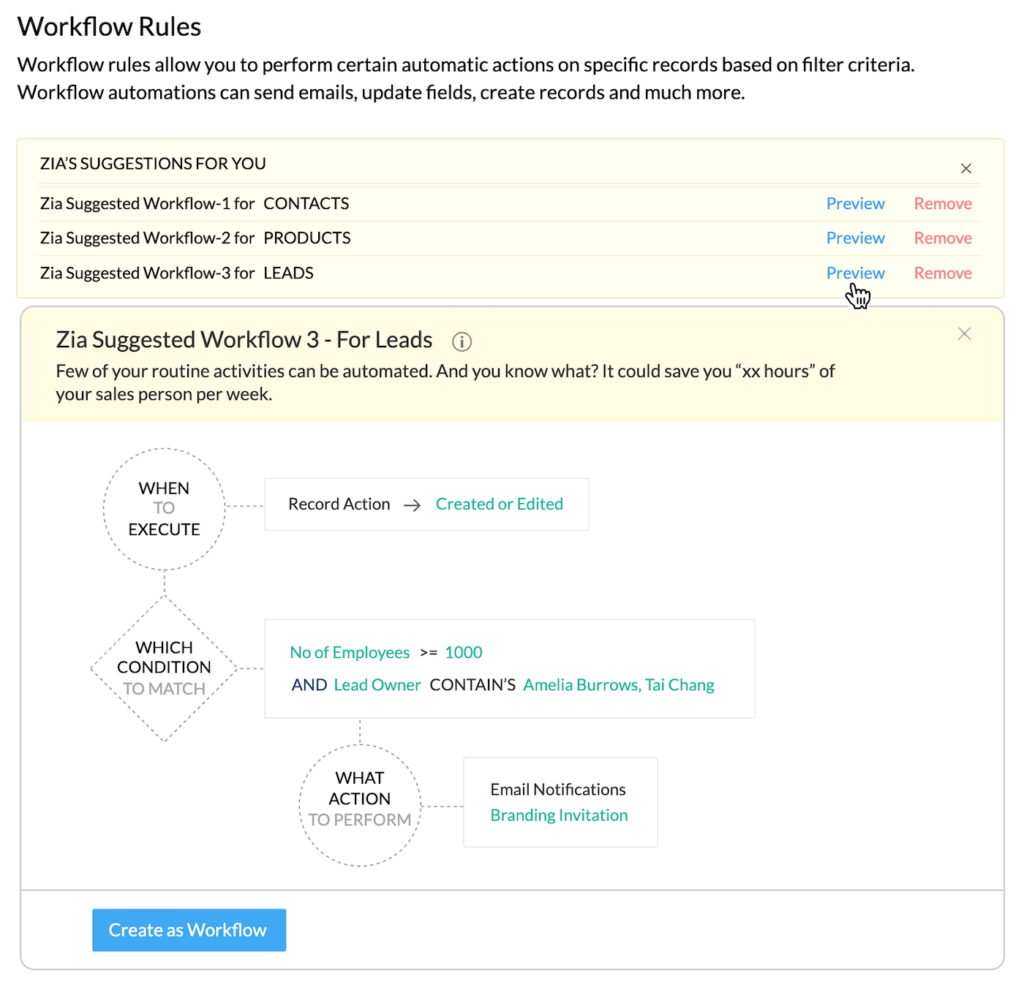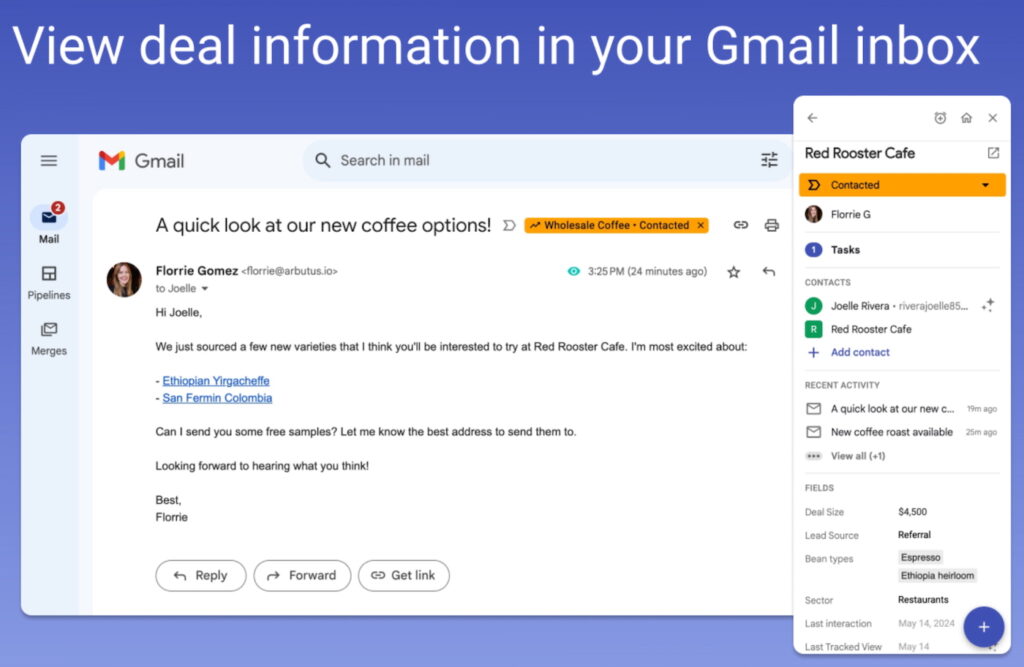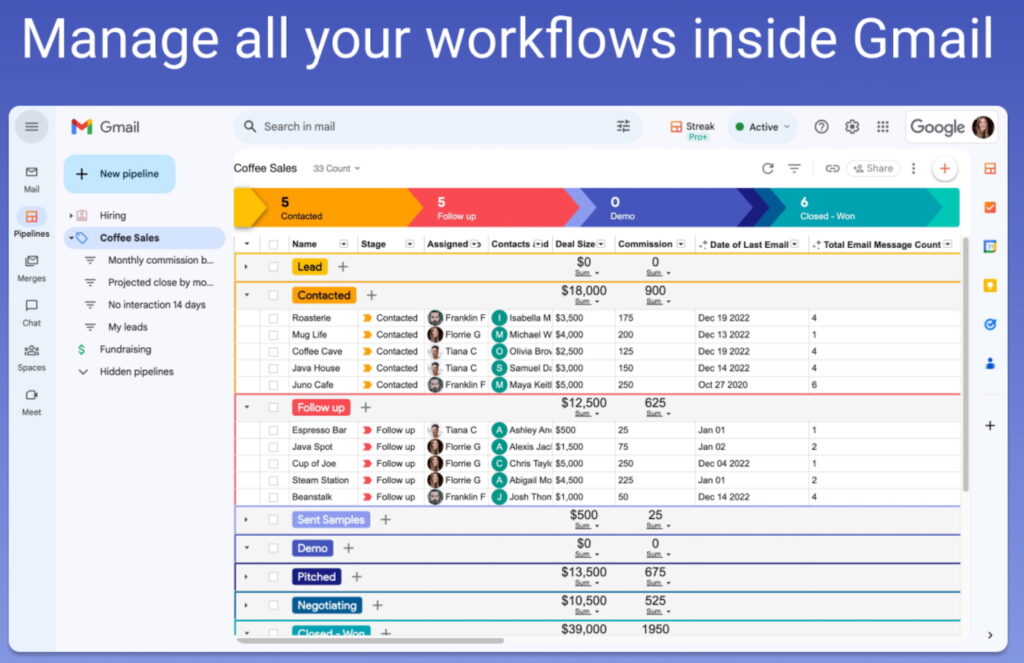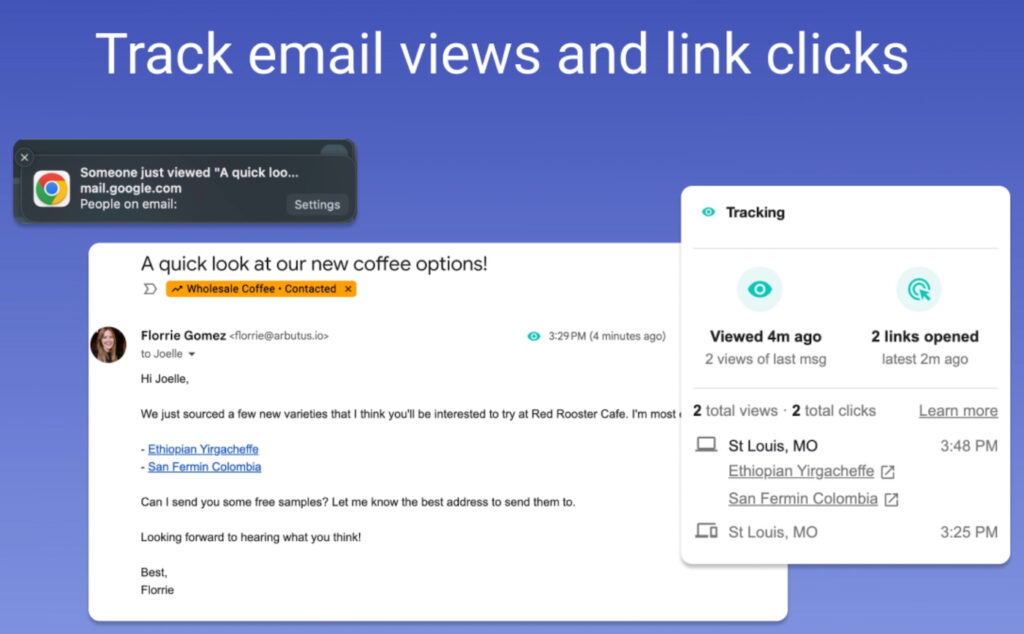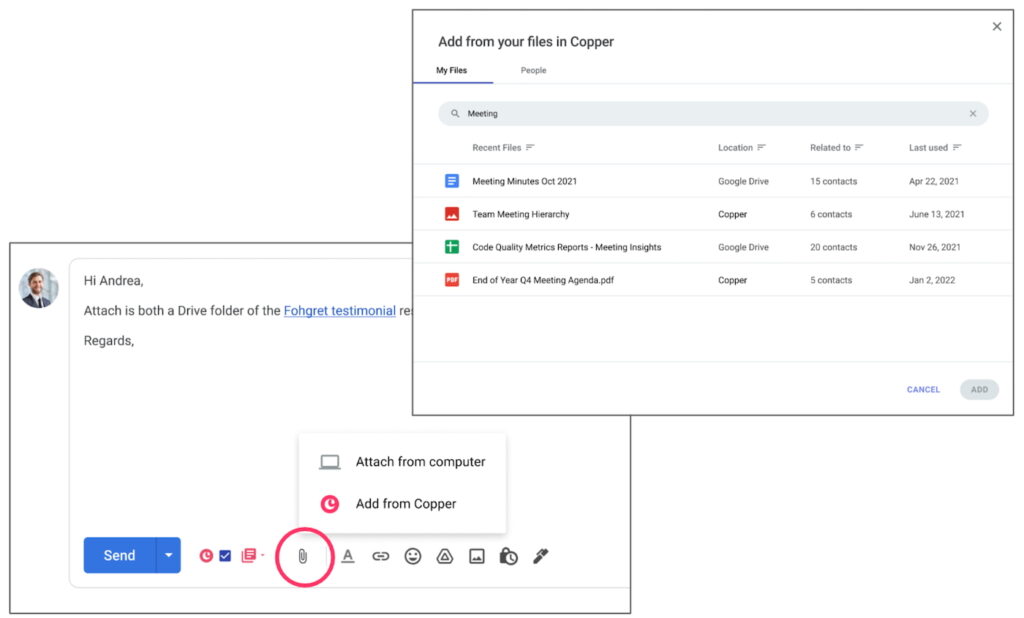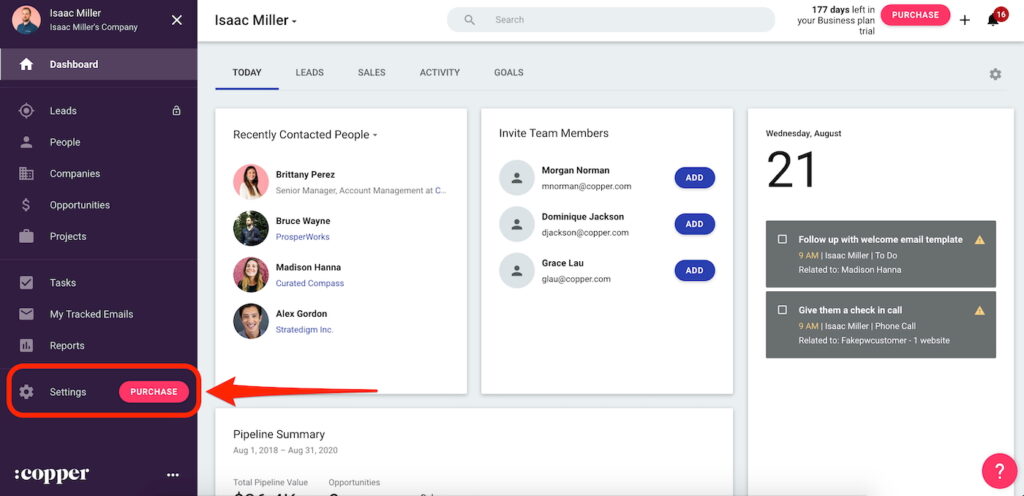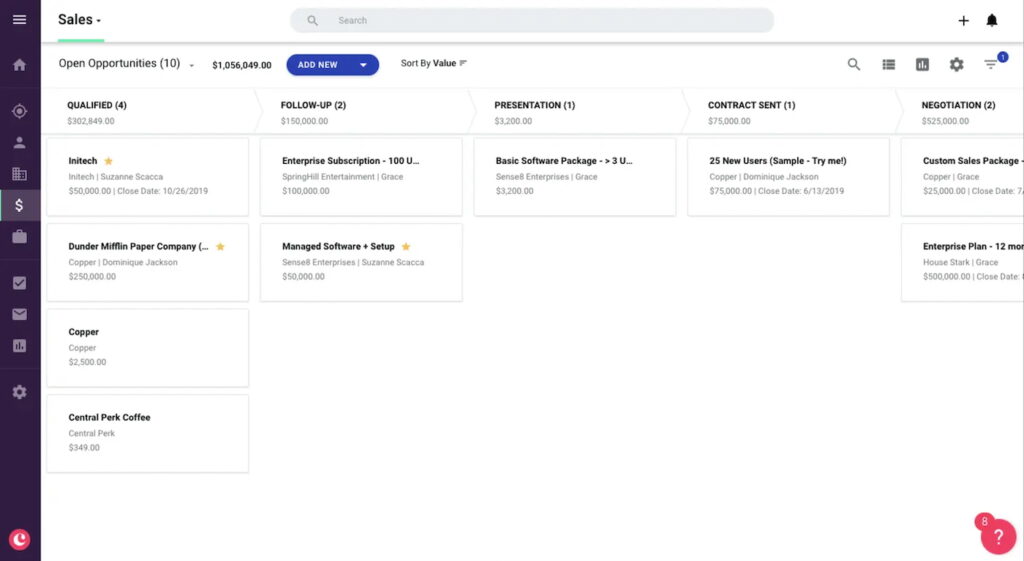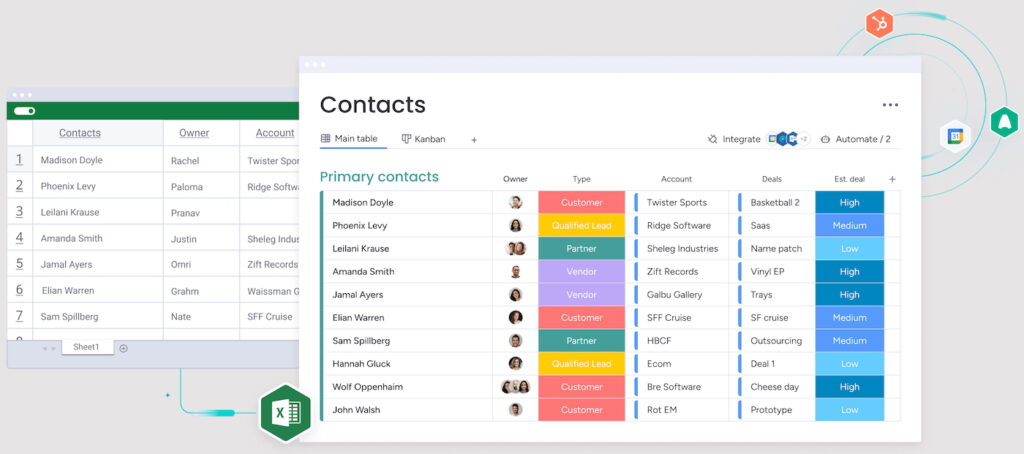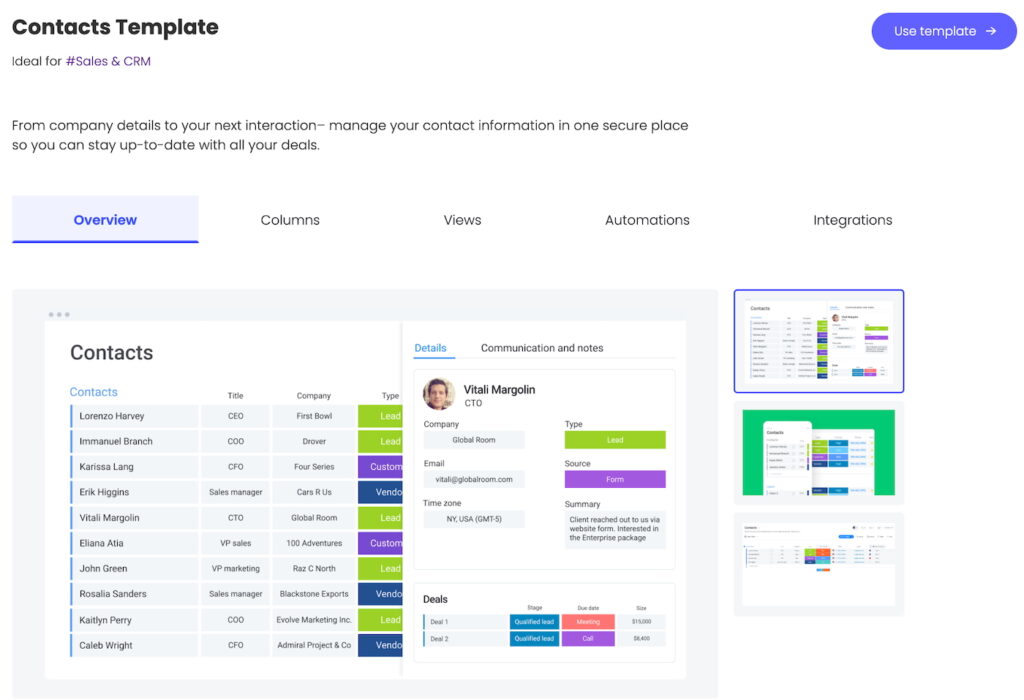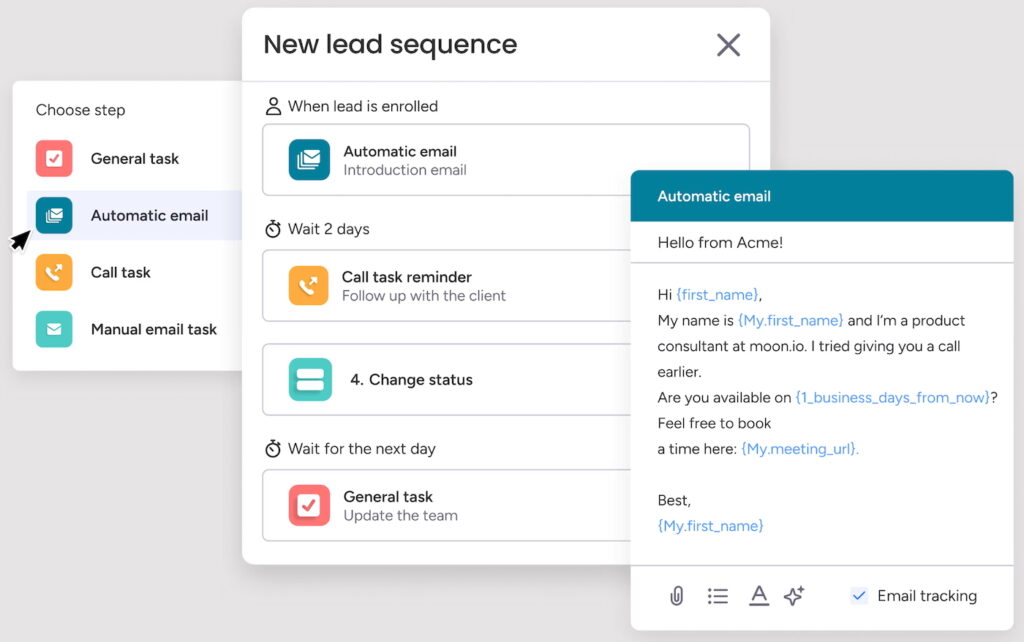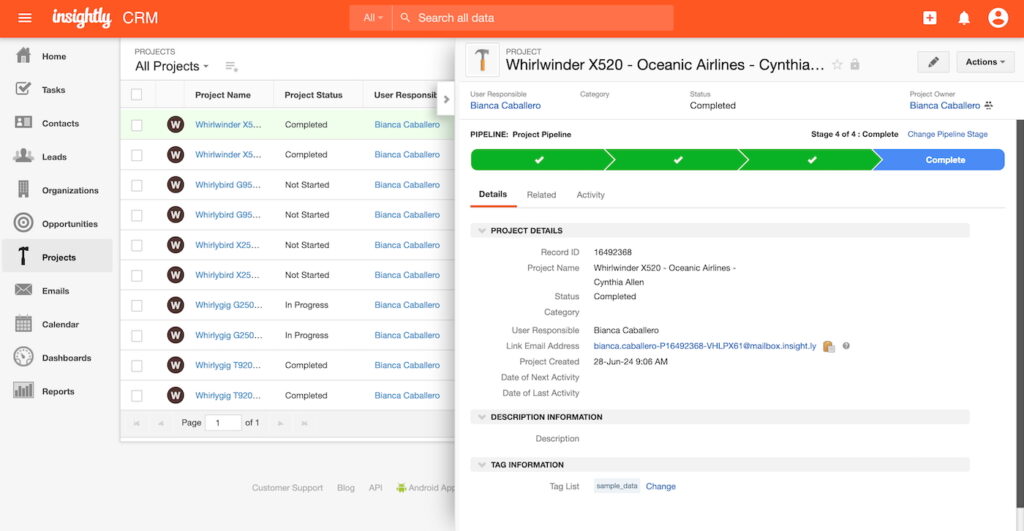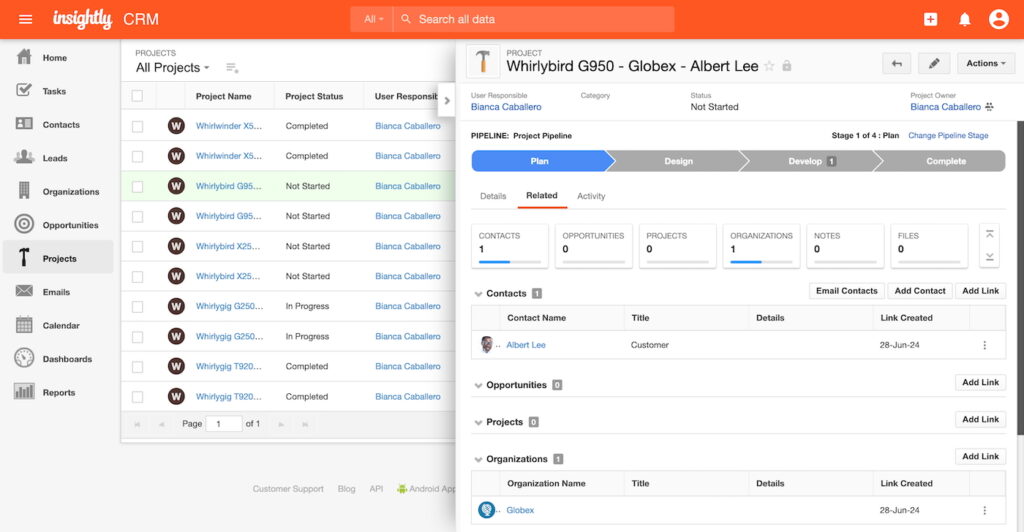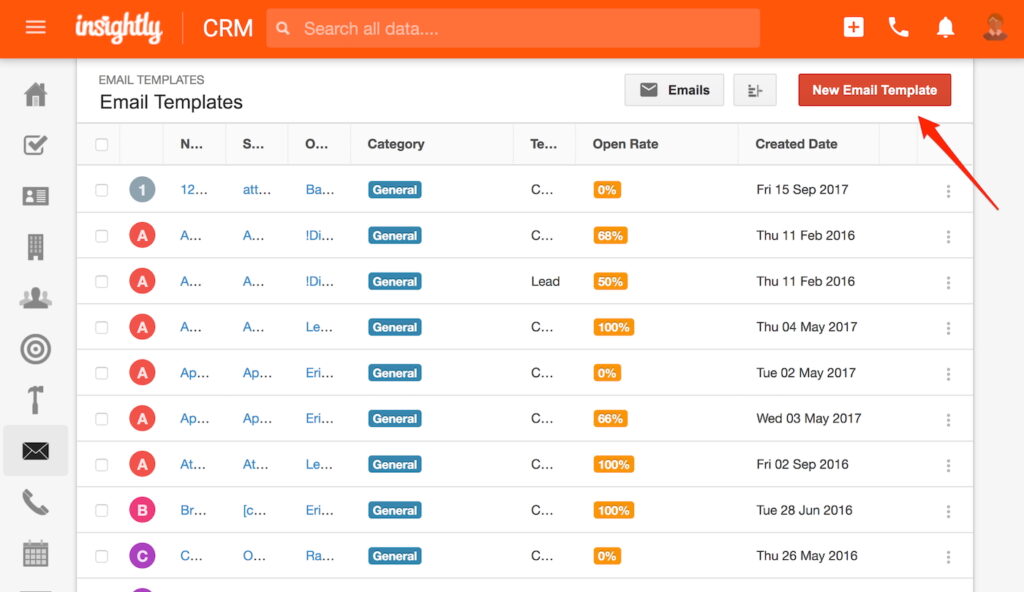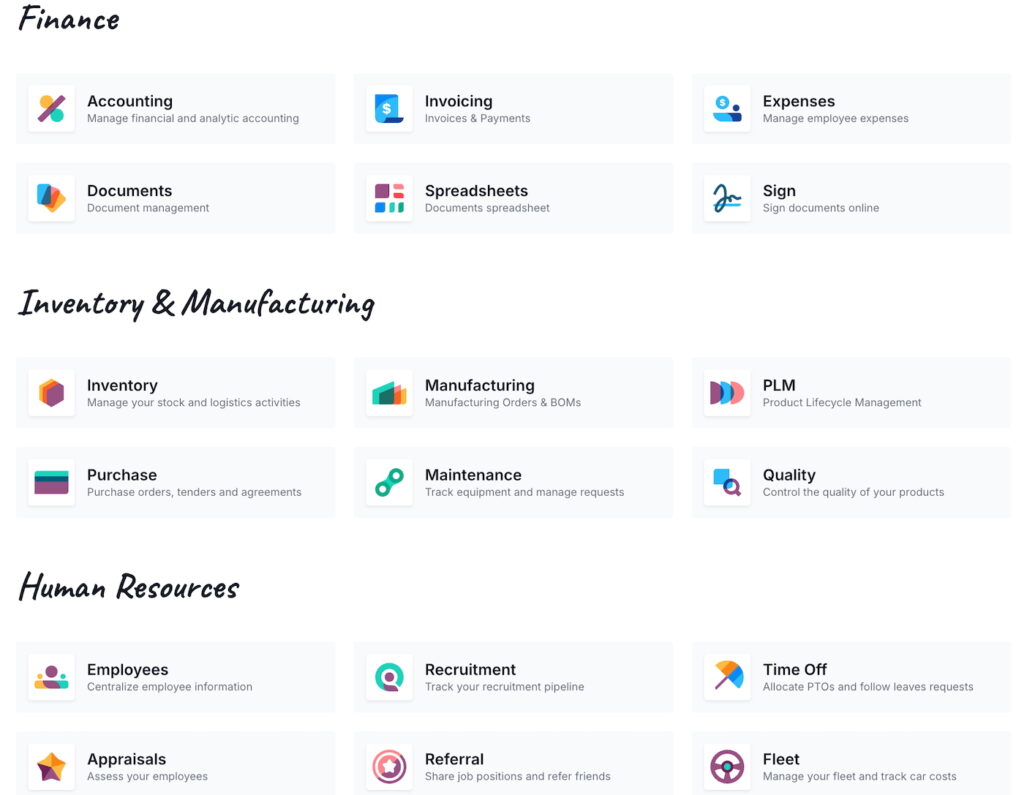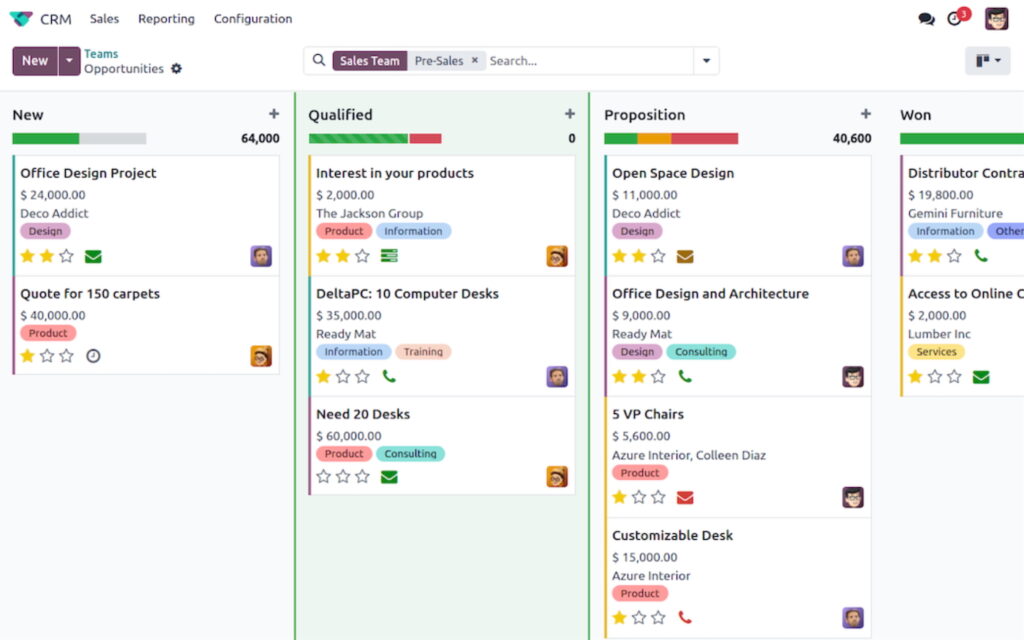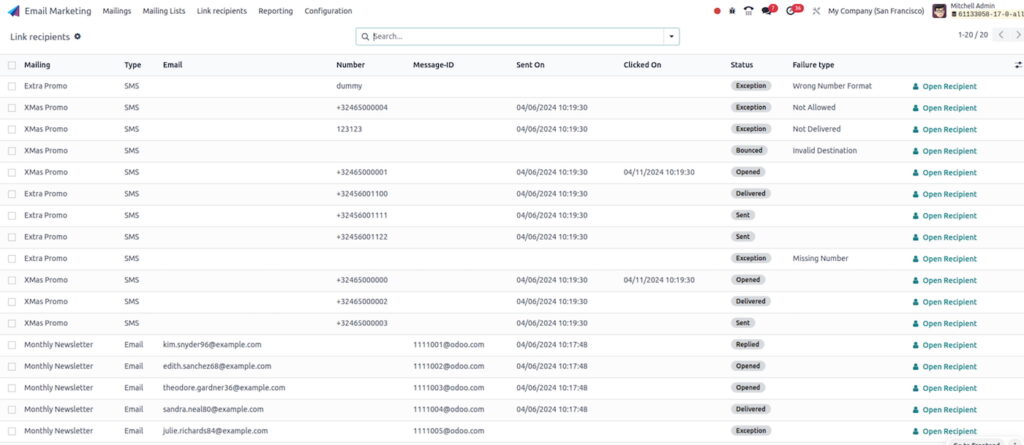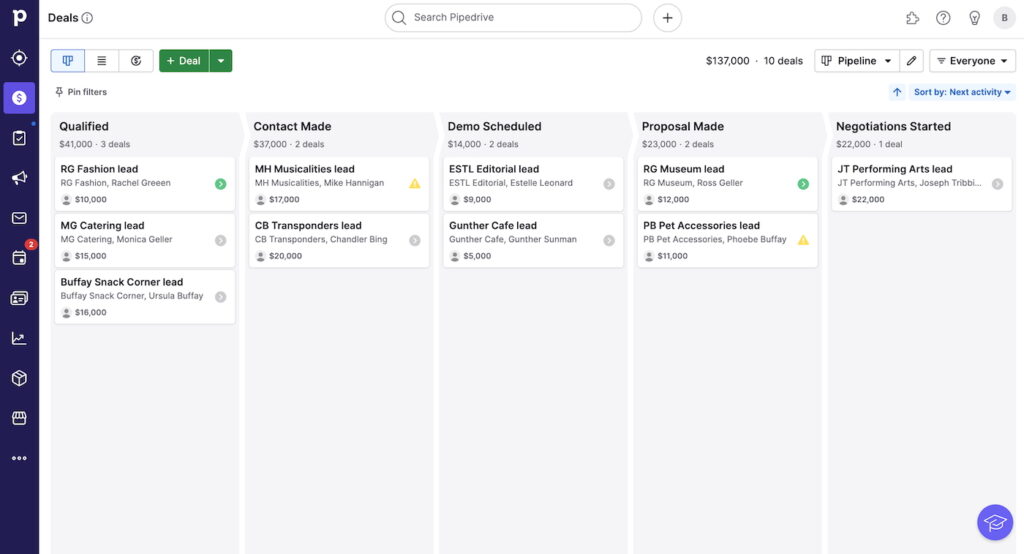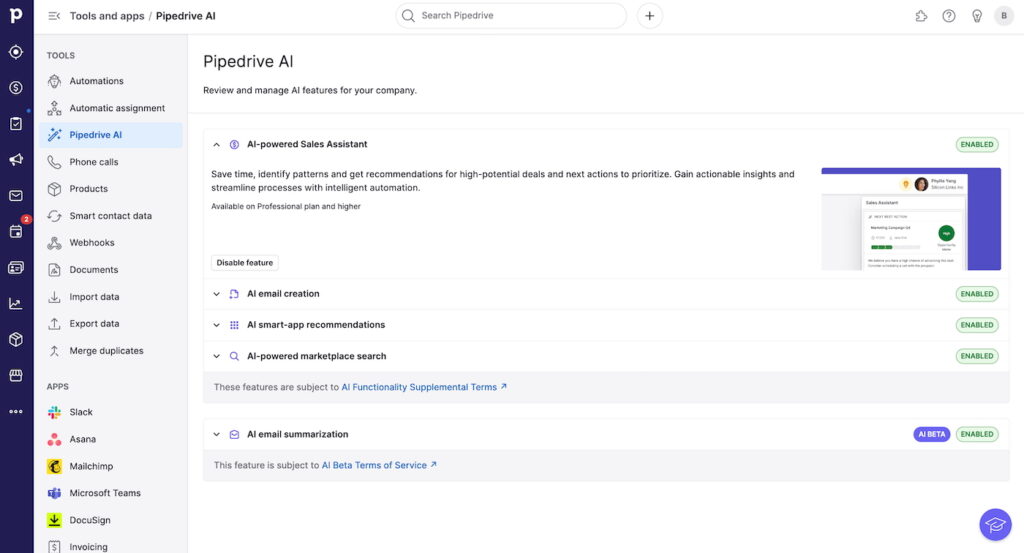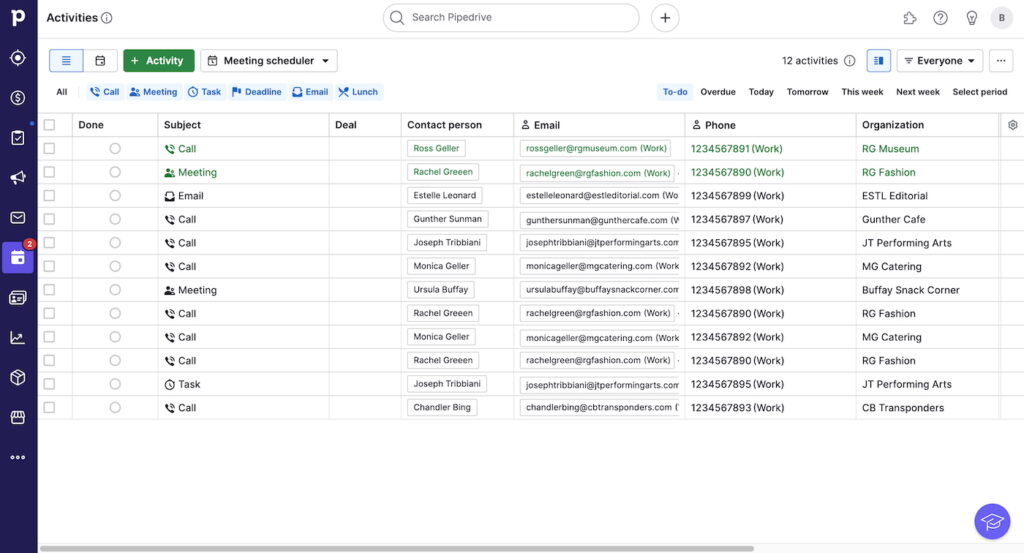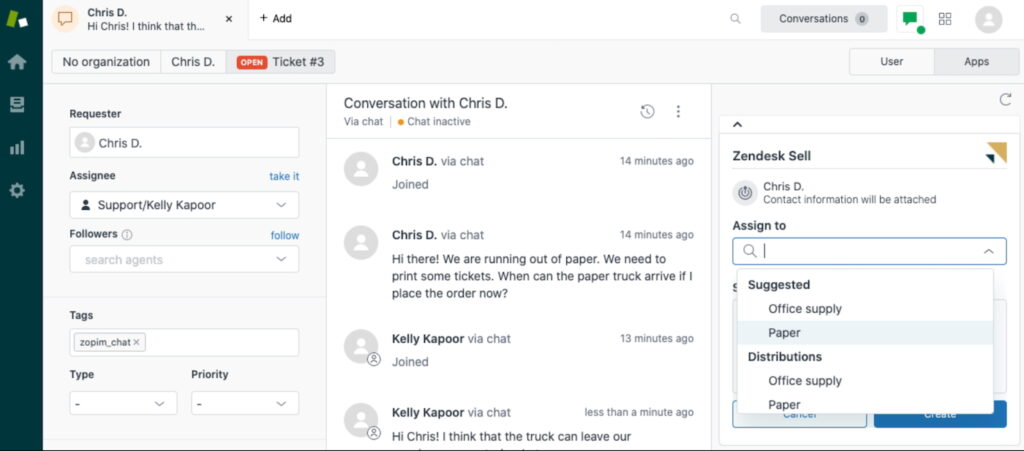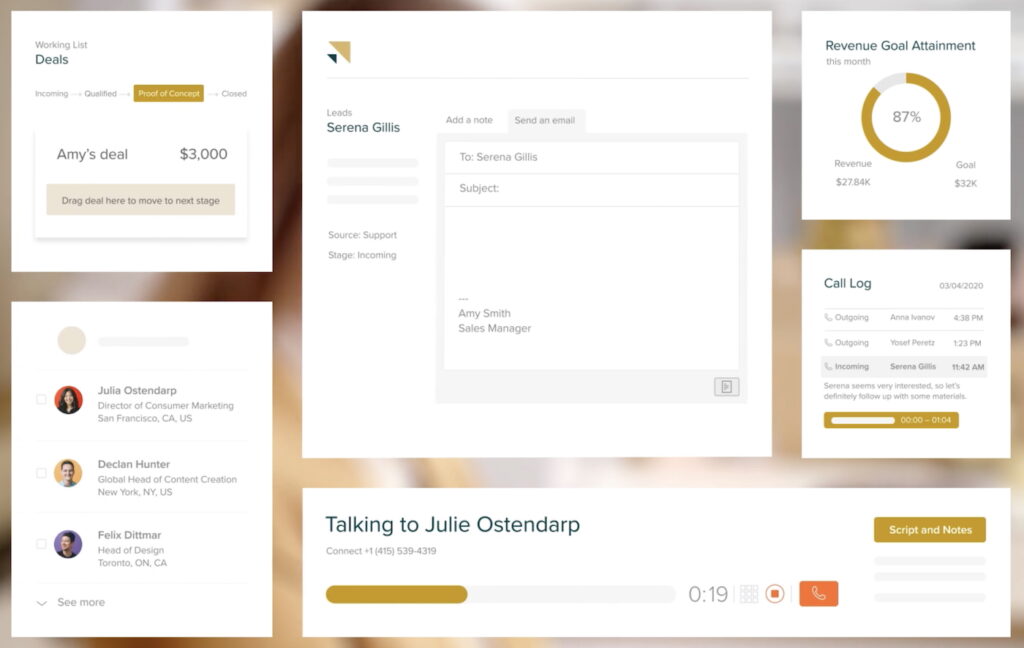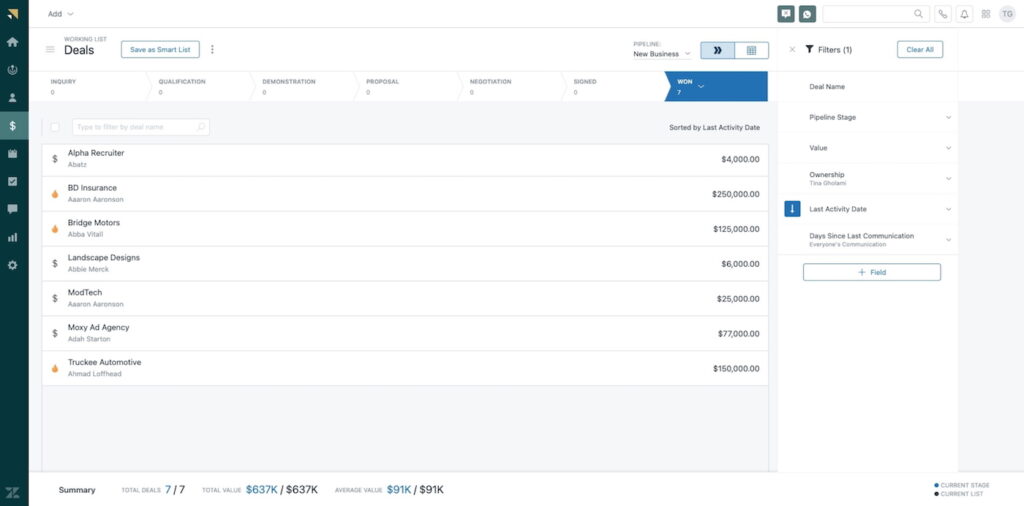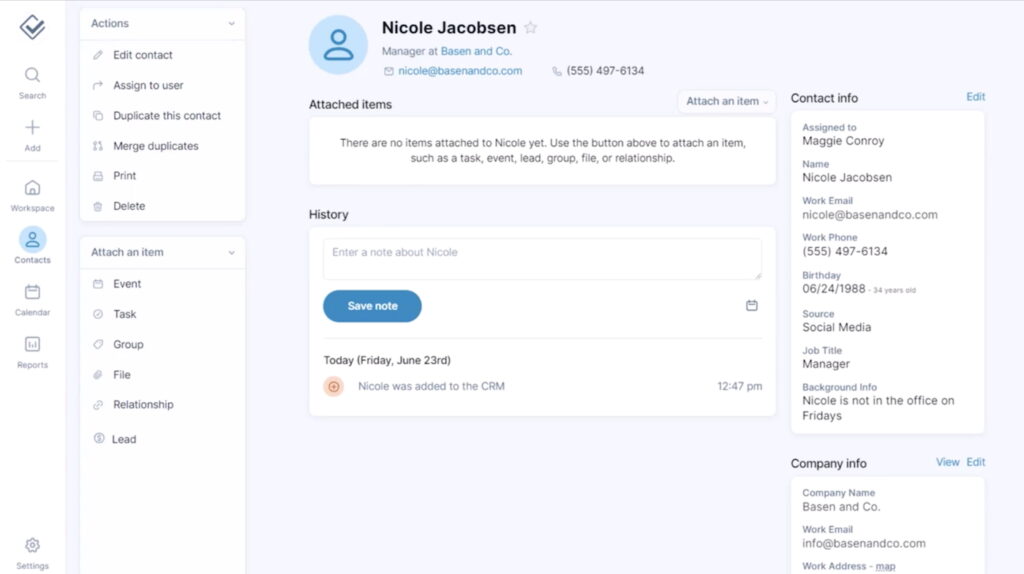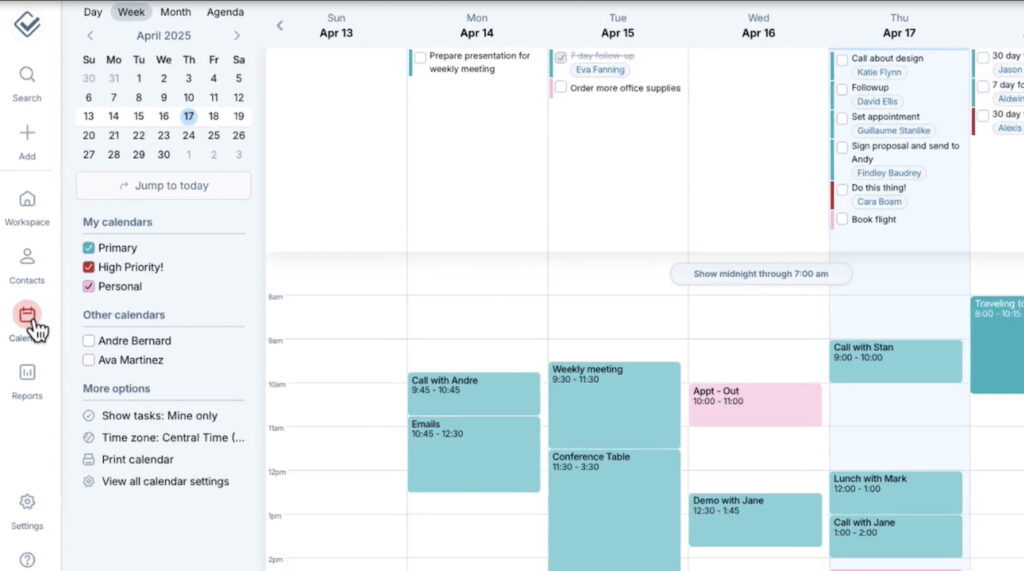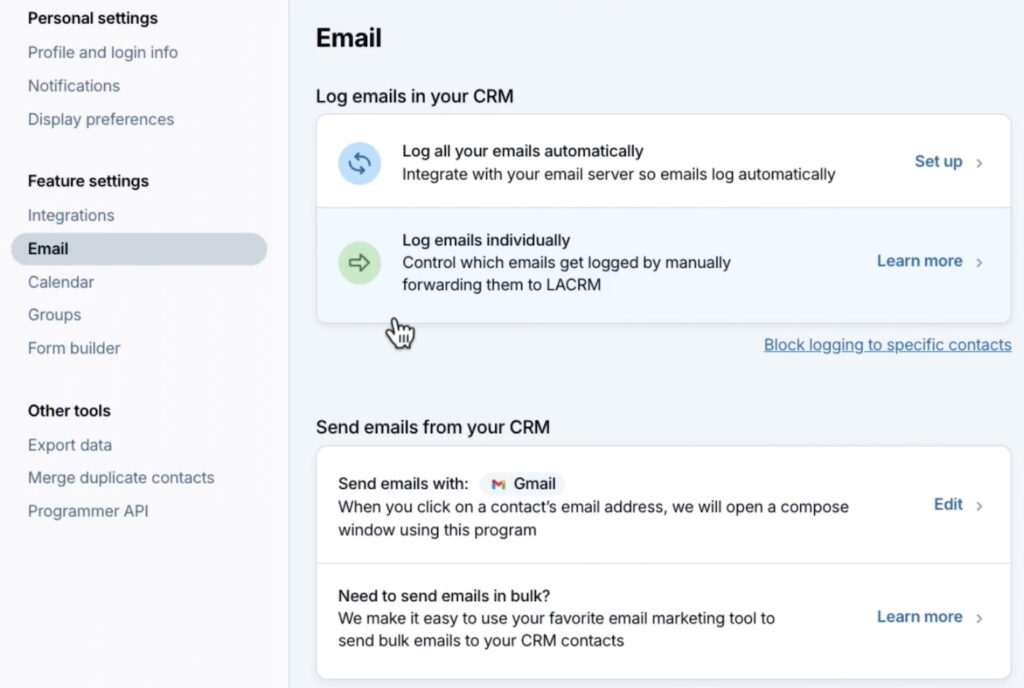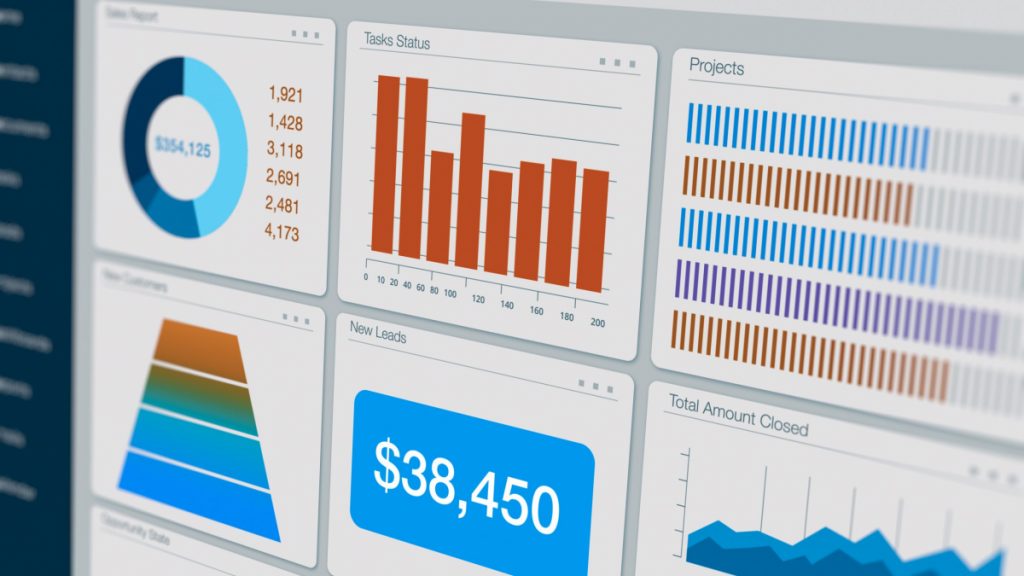Choosing the right customer relationship management (CRM) software can be overwhelming, especially for beginners navigating complex features and bloated interfaces. Whether you’re a small business, solo entrepreneur, or growing sales team, this guide highlights user-friendly CRM solutions that offer quick setup, intuitive design, and streamlined tools to manage customer relationships with confidence and ease.
To help you select the easiest CRM to use, we evaluated dozens of providers based on pricing and features and narrowed down the list to the top 10.
What is an easy CRM?
A simple CRM software is a streamlined tool that helps small businesses organize contacts, track interactions, and manage sales without the clutter of enterprise-level features. Salespeople can easily be overwhelmed by bulky platforms with all the bells and whistles. The best simple CRMs cut through that noise, focusing on core functions like pipeline tracking and task management, making them ideal for teams that need results, not complexity.
Top easy CRM systems at a glance
Pipeline management
Email tracking
AI automation
My rating
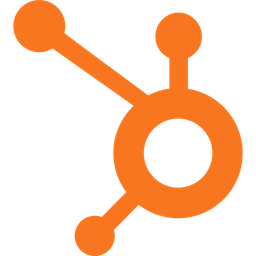
HubSpot CRM
Visual, drag-and-drop pipelines
✅
✅
4.4
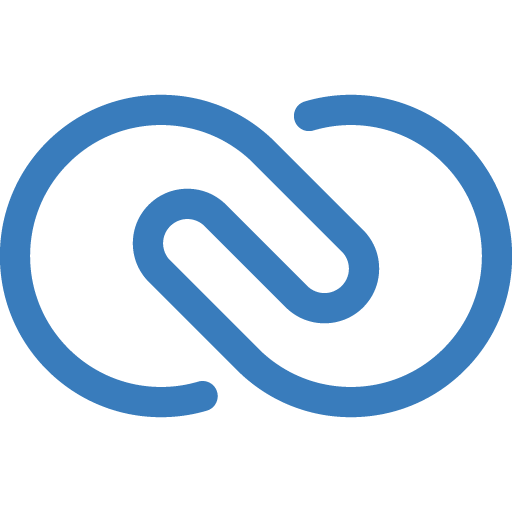
Zoho CRM
Customizable pipelines
✅
✅
4.4

Streak CRM
Pipelines inside Gmail
✅
❌
4.4
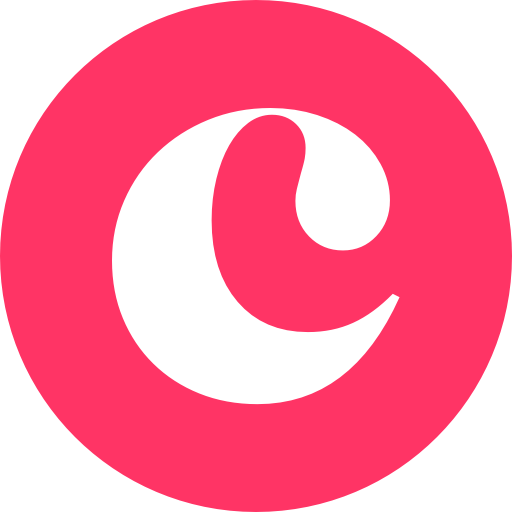
Copper CRM
Simple, Google-style pipelines
✅
✅
4.4

monday CRM
Fully customizable visual pipelines
✅
✅
4.4

Insightly CRM
Combined pipeline and project tracking
✅
❌
4.4

Odoo CRM
Kanban-style pipeline view
✅
❌
4.4
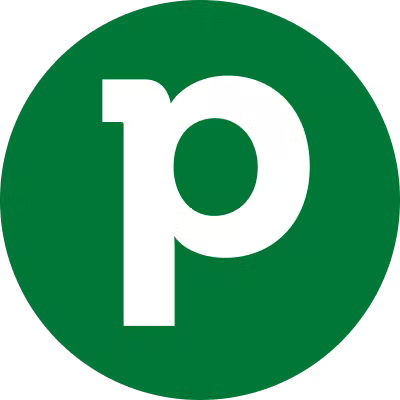
Pipedrive
Intuitive drag-and-drop pipelines
✅
✅
4.4
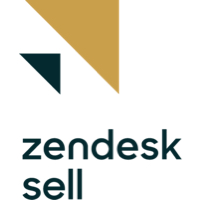
Zendesk Sell
Streamlined pipelines for sales reps
✅
✅
4.4

Less Annoying CRM
Simple, linear pipeline
✅
❌
4.4

HubSpot CRM: Best free, simple CRM
Overall Score
4.61/5
Pricing
3.88/5
Key features
4.67/5
Ease of use
5/5
Support
4.69/5
Expert score
4.5/5
Pros
- Two-user free plan has all-in-one CRM features
- Free email automation features without coding
- Simple layout with quick navigation
Cons
- Huge price jump from Starter to Professional tier
- Limited workflow customization
- Deal and company scoring is locked in with Sales Hub Professional
HubSpot CRM is the number one easy CRM because of its user-friendly interface, no-cost entry point, and quick setup. Beginners without technical skills can easily manage contacts, track deals, and automate emails.
Its free plan includes core features that many CRMs charge for. Seamless integrations with Gmail, Outlook, and popular business tools make it ideal for small teams. It’s simple, scalable, and designed to grow with your business, which is one reason I am most impressed by HubSpot. It retains its simplicity despite being one of the most robust all-in-one CRMs in the market.
- Intuitive contact management: HubSpot makes it easy to organize, track, and manage all your customer interactions in one place. Its clean dashboard lets you view contact details, activity history, and communication timelines at a glance.
- Built-in email tools: Follow up faster and more effectively by sending, scheduling, and tracking emails directly from the CRM.
- Visual sales pipeline: HubSpot’s drag-and-drop pipeline lets you easily monitor deals through every stage. You can customize stages to fit your sales process and quickly spot bottlenecks or opportunities.
Free tools: $0 for two users
- Contact management
- Meeting scheduling
- Email templates
- Stripe payment processing
- Live chat
Sales Hub Starter: $15/user/month, billed annually ($20/user/month, billed monthly)
- All free tools
- Simple automation
- HubSpot payments
- Conversation routing
- Sales content analytics
Starter Customer Platform: $15/user/month, billed annually ($20/user/month, billed monthly)
- Sales Hub Starter
- Marketing Hub Starter
- Service Hub Starter
- Operations Hub Starter
- Content Hub Starter
Sales Hub Professional: $90/user/month, billed annually ($100/user/month, billed monthly)
- Everything in the Sales Hub Starter
- Deal and company scoring
- AI Meeting Assistant
- Forecasting
- Conversation intelligence
Sales Hub Enterprise: $150/user/month, billed annually
- Everything in the Sales Hub Professional
- Interactive Voice Response (IVR)
- Lead form routing
- Deal journey analytics
- Team management

Zoho CRM: Best for growing teams needing deep customization
Overall Score
4.58/5
Pricing
5/5
Key features
4.32/5
Ease of use
4/5
Support
4.69/5
Expert score
4.44/5
Pros
- Highly customizable fields, layouts, and automation workflows
- Cost-scalable plans for small teams to large enterprises
- Strong integration ecosystem with Zoho’s suite and third-party apps
Cons
- Basic customer support is limited to email and self-service resources
- 1GB file storage limit per organization; only the Ultimate plan has 5GB file storage
- AI features are locked in with the Professional plan
Zoho CRM is an easy CRM for beginners, thanks to its intuitive interface and flexible setup. Despite its beginner-friendly design, it offers deep customization options, allowing businesses of all sizes to tailor modules, workflows, and dashboards to match their unique sales processes. I especially like that it offers cost-scalable plans, making it perfect for growing teams that want a simple start without sacrificing scalability.
- Customizable dashboards and modules: Zoho CRM allows users to tailor dashboards, fields, and sales pipelines to match their unique business processes. This flexibility helps beginners set up a system that feels familiar and intuitive from day one.
- Zia AI: Zia, Zoho CRM’s AI-powered sales assistant, provides real-time suggestions, forecasts, and anomaly detection to help sales reps make smarter decisions faster. It’s like having a virtual assistant guiding new users through tasks and insights.
- Workflow automation: Beginners can automate repetitive tasks like sending emails, updating records, or assigning leads using simple rule-based workflows. This streamlines daily activities and reduces the risk of human error.
Free: $0 for three users
- Lead, account, contact, and deal management
- 1GB file storage
- Standard CRM reports
- Campaigns and custom email templates
- Workflow rules
Standard: $14/user/month, billed annually ($20/user/month, billed monthly)
- Everything in the free plan
- Sales forecasting
- Custom fields, reports, and dashboards
- Mass emailing
- Access to CRM Marketplace integrations
Professional: $23/user/month, billed annually ($35/user/month, billed monthly)
- Everything in the Standard plan
- Zia AI insights for emails
- Inventory management and CPQ (Configure, Price, Quote)
- Email integration
- Case management
Enterprise: $40/user/month, billed annually ($50/user/month, billed monthly)
- Everything in the Professional plan
- Anomaly detector
- Autoresponders
- Zia AI scoring and prediction
- Customer journey builder
Ultimate: $52/user/month, billed annually ($65/user/month, billed monthly)
- Everything in the Enterprise plan
- Highest feature limits

Streak CRM: Best for managing deals from Gmail
Overall Score
4.57/5
Pricing
5/5
Key features
4.44/5
Ease of use
4.4/5
Support
4.69/5
Expert score
3.44/5
Pros
- Seamless Gmail integration allows users to operate CRM from the inbox
- Customizable pipelines with spreadsheet-style interface
- Built-in email tools like email tracking, mail merge, and scheduled sending
Cons
- Limited outside of Gmail
- Lacks advanced analytics and forecasting features
- Pipelines can get cluttered as data volume grows
As a former sales territory manager, I know how overwhelming CRMs can be for newcomers, but Streak CRM breaks that mold. It lives directly inside Gmail, turning the inbox into a familiar, no-fuss sales hub.
There’s no steep learning curve and no switching between tabs, just streamlined pipeline tracking and communication in one place. For beginners, especially solo users or small teams, it’s an ideal entry point into CRM without the typical headaches.
- Gmail integration: Streak CRM lives entirely inside Gmail, making it easy for beginners to manage contacts, track deals, and follow up on leads without switching platforms. This familiar interface significantly shortens the learning curve.
- Pipeline management: Users can create customizable pipelines directly in their inbox to track sales stages, customer support tickets, or project progress. This feature is ideal for small teams that want a visual workflow without a complex setup.
- Email tracking and automation: Streak CRM’s built-in email tracking, mail merge, and automation tools help users know when emails are opened and send timely follow-ups. These features effortlessly enhance productivity and improve response rates.
Free: $0 for one user
- Email tracking
- Link tracking
- Email sharing
- Snippets
- Mail merge (up to 50 per day)
Pro: $49/user/month, billed annually ($59/user/month, billed monthly)
- Everything in the free plan
- Mail merge (up to 1,500 per day)
- Private and shared pipelines
- Contact enrichment
- Native dialer support
Pro+: $69/user/month, billed annually ($89/user/month, billed monthly)
- Everything in the Pro plan
- AI Co-pilot for deal summaries and auto-enrichment
- Automations
- Third-party integrations
Enterprise: $129/user/month, billed annually ($159/user/month, billed monthly)
- Everything in the Pro+ plan
- Data validation
- Custom permissions

Copper CRM: Simplest CRM for Google Workspace users
Overall Score
4.52/5
Pricing
4.5/5
Key features
4.46/5
Ease of use
4.75/5
Support
4.06/5
Expert score
4.06/5
Pros
- Native Google Workspace integration
- Clean and intuitive interface with familiar Google design
- Automated data entry
Cons
- Limited customization for complex workflows
- Workflow automation and advanced reporting are locked in with higher tiers
- Limited support and integration options for non-Google users
Copper CRM integrates seamlessly with Google Workspace, making it a natural fit for teams using Gmail, Google Calendar, and Drive. I love how it syncs data effortlessly across Google apps, reducing the need to switch between platforms. Its simple interface also makes staying organized easy while supporting collaboration. Plus, it offers an intuitive CRM experience right out of the box for businesses already working in Google’s ecosystem.
- Deep Google Workspace integration: Copper CRM is designed to work seamlessly with Google Workspace tools like Gmail, Google Calendar, and Google Drive. This tight integration makes it a natural fit for users already using Google apps, reducing the need for extra training.
- Automatic contact and activity syncing: This platform saves time by automatically pulling contact details and tracking email interactions, meetings, and calls so users don’t have to log activities manually.
- Visual sales pipelines: Its drag-and-drop pipeline view helps beginners manage deals with a clear, visual layout. Users can easily track progress and identify next steps without digging through complex menus.
Starter: $9/user/month, billed annually ($12/user/month, billed monthly)
- 1,000 contacts
- Google Workspace integrations
- Tasks and activity feed
- AI email template generator
- Contact forms
Basic: $23/user/month, billed annually ($29/user/month, billed monthly)
- Everything in the Starter plan
- 2,500 contacts
- Opportunity, pipeline, and project management
- Task automation
Professional: $59/user/month, billed annually ($69/user/month, billed monthly)
- Everything in the Basic plan
- 15,000 contacts
- Lead management
- Google Sheets and Looker Studio integration
- Workflow automation
- Activity and pipeline reports
Business: $99/user/month, billed annually ($134/user/month, billed monthly)
- Everything in the Professional plan
- Unlimited contacts
- Unlimited custom fields
- Email click tracking and email series
- Custom reports

monday CRM: Simplest CRM for cross-functional sales and ops teams
Overall Score
4.51/5
Pricing
4.5/5
Key features
4.25/5
Ease of use
4.5/5
Support
4.75/5
Expert score
4.25/5
Pros
- Visual, customizable interface for pipeline and task management
- Unlimited contacts and boards
- Quick onboarding with pre-built templates
Cons
- No free plan and a three-user minimum requirement for all plan subscriptions
- The interface can easily become cluttered with scale
- Lead scoring is exclusive to the Enterprise plan
monday CRM is more than just an easy CRM — it’s a flexible work management hub. Sales, marketing, and operations teams can collaborate in one visual platform, managing leads, tasks, and workflows side by side. The interface is colorful and easy to navigate. If you’re a salesperson like me who appreciates non-technical processes, you will surely appreciate how its no-code customization makes it simple to mold to your team’s unique rhythm.
- Visual, drag-and-drop boards: monday CRM offers a highly visual layout with drag-and-drop boards that make organizing leads, deals, and tasks intuitive, even for first-time CRM users. This format helps teams quickly understand their workflow at a glance.
- Customizable CRM templates: Its pre-built CRM templates for sales pipelines, contact management, and lead tracking can be easily tailored to fit your business needs. This saves time and removes the guesswork for beginners.
- Centralized contact and communication management: monday CRM stores all lead, contact, and customer information in one place, along with email sync and activity tracking. This ensures teams have complete visibility into every interaction throughout the sales cycle.
Basic: $12/user/month, billed annually ($15/user/month, billed monthly)
- Unlimited contacts, boards, and customizable pipelines
- Templates for lead, deal, and contact management
- Embedded documents
Standard: $17/user/month, billed annually ($20/user/month, billed monthly)
- Everything in the Basic plan
- Integrations
- AI email generator
- Automations
- Lead, account, contact, and deal management
Pro: $28/user/month, billed annually ($33/user/month, billed monthly)
- Everything in the Standard plan
- Email templates, tracking, and automations
- Sales forecasting and analytics
- Email and task sequences
Enterprise: Contact the provider for a custom quote.
- Everything in the Pro plan
- Post-sales management
- Sales operations management
- Enterprise reporting and analytics
- Lead scoring
*Requires a minimum of three users.

Insightly CRM: Best simple CRM for project management and delivery
Overall Score
4.44/5
Pricing
4.5/5
Key features
4.83/5
Ease of use
3.75/5
Support
4.38/5
Expert score
3.88/5
Pros
- Built-in tools for project management and delivery
- Strong customization options for fields, workflows, and dashboards
- Clean, modern, and intuitive interface
Cons
- No built-in marketing features; requires subscription to Insightly Marketing or third-party integration
- Steep learning curve for tailored workflows and customizations
- Lead assignment rules and workflow automation are locked in with higher tiers
Insightly CRM made the list of the simplest CRMs for how well it blends sales and project management. After closing a deal, you can seamlessly move into project delivery without switching platforms.
It’s easy to use, yet it offers the structure and tools to track progress and meet deadlines. I highly recommend leveraging its contact relationship linking feature to track customer relationships and project fulfillment.
- Unified sales and project management: Insightly combines CRM and project management tools in one platform, making it easy to track deals and seamlessly transition them into projects. This is especially helpful for teams that handle post-sale delivery or service work.
- Relationship linking: This platform allows users to link related contacts, organizations, and opportunities, providing a clear view of complex business relationships.
- Email tracking and templates: Insightly CRM’s built-in email tracking, scheduling, and customizable templates help users communicate efficiently with prospects and customers. These features save time and ensure consistent follow-ups.
Plus: $29/user/month, billed annually ($35/user/month, billed monthly)
- 100,000 contact records
- Lead management
- AI email summaries and replies
- Automated and customized emails
- Project management and delivery
Professional: $49/user/month, billed annually ($59/user/month, billed monthly)
- Everything in the Plus plan
- 250,000 contact records
- Lead assignment and routing
- Customizable insight cards and page layouts
- Workflow automation
Enterprise: $99/user/month, billed annually ($129/user/month, billed monthly)
- Everything in the Professional plan
- 500,000 contact records
- Custom apps
- Products, price books, and quotes
- Field-based permissions

Odoo CRM: Best for CRM-ERP integration
Overall Score
4.41/5
Pricing
5/5
Key features
4.4/5
Ease of use
4/5
Support
3.75/5
Expert score
3.88/5
Pros
- Modular platform with access to various apps, including finance, inventory, and marketing
- Drag-and-drop Kanban interface for easy lead tracking
- Free, open-source CRM with email integration, website builder, and productivity tools
Cons
- Steeper setup required to integrate CRM with other Odoo apps
- Advanced automation and marketing tools require additional app installation and configuration
- AI invoicing and advanced accounting are locked in with the Enterprise tier
Odoo is ideal for teams that want more than just a CRM. What I like most is its modular structure, which lets you build out a complete ERP solution that integrates several apps. These include sales, finance, human resources, marketing, service, supply chain, websites, and productivity.
The CRM module is easy to start with and grows with your business. Odoo is the simplest CRM for organizations seeking a unified business management platform.
- Multi-app integration within Odoo: As part of the Odoo suite, the CRM integrates natively with related apps like Sales, Invoicing, Marketing, and Inventory. This makes it easy to build a fully unified business management system over time.
- Lead and opportunity management: Users can create, assign, and qualify leads, convert them into opportunities, and track interactions in one centralized place. Leads can also be enriched automatically with data from emails or web forms.
- Email and communication tracking: The CRM integrates with email clients to log conversations and track communication history within each lead or opportunity record, keeping sales interactions organized and accessible.
Free: $0 for unlimited users
- Access to one app
- Odoo Online
Standard: $7.25/user/month, billed annually ($9.10/user/month, billed monthly)
- Access to all apps
- Odoo Online
Custom: $10.90/user/month, billed annually ($13.60/user/month, billed monthly)
- Everything in the Standard plan
- Odoo.sh for cloud-based hosting
- On-premise
- Multi-company support
- External API

Pipedrive: Best for visual sales pipeline management
Overall Score
4.39/5
Pricing
4.5/5
Key features
4.12/5
Ease of use
5/5
Support
3.88/5
Expert score
3.69/5
Pros
- Visual, drag-and-drop sales pipeline
- Sales Assistant and Smart Contact Data save time through automated lead nurturing and data entry
- Solid integration with popular tools like Slack, Microsoft Outlook, and Google Workspace
Cons
- Lacks native tools for advanced marketing and customer service
- Lead generation and web tracking tools require add-on fees
- Simplicity can be a drawback for businesses needing specific CRM customizations
Pipedrive is the simplest CRM for salespeople who think in terms of deals and stages. The visual pipeline is clear, interactive, and helps keep everyone focused on closing deals. I appreciate how its built-in tutorials, smart data entry, and AI Sales Assistant make it fast to set up and intuitive to use. I highly recommend it for sales teams that value a clean visual workflow.
- Visual sales pipeline: Pipedrive’s signature drag-and-drop pipeline makes it easy for users to track deals, update statuses, and spot bottlenecks in real time. It’s ideal for beginners who prefer a clear, hands-on view of their sales flow.
- AI Sales Assistant: This platform offers smart performance tips, automation suggestions, and activity insights based on user behavior. It helps beginners make smarter decisions and improve productivity with minimal effort.
- Sales activity reminders: Pipedrive prompts users to schedule and complete tasks like calls, meetings, or follow-ups, helping sales reps stay on top of their daily activities. This keeps pipelines moving and opportunities from slipping through the cracks.
Essential: $14/user/month, billed annually ($24/user/month, billed monthly)
- Lead, deal, calendar, and pipeline management
- Products catalog
- Sales Assistant
- AI app recommendations and report creation
- Dashboards and reports
Advanced: $39/user/month, billed annually ($49/user/month, billed monthly)
- Everything in the Essential plan
- Two-way email sync with email tracking
- Meeting scheduler
- Automations
- Product revenue forecasts
Professional: $49/user/month, billed annually ($69/user/month, billed monthly)
- Everything in the Advanced plan
- Multiple email accounts sync
- Smart Docs with e-signature
- Automatic assignment
- Team filters and goals
Power: $64/user/month, billed annually ($79/user/month, billed monthly)
- Everything in the Professional plan
- Project management
- 24/7 live chat support
- Phone support
Enterprise: $99/user/month, billed annually ($129/user/month, billed monthly)
- Everything in the Power plan
- Unlimited deals, custom fields, reports, and teams
- Security alerts and rules
- Non-developer sandbox account

Zendesk Sell: Easiest CRM system for aligning sales and support teams
Overall Score
4.34/5
Pricing
4.5/5
Key features
4.48/5
Ease of use
4/5
Support
4.06/5
Expert score
3.81/5
Pros
- Seamless integration with Zendesk Support suite
- Sleek and user-friendly interface simplifies navigation for easy lead and deal management
- Robust and intuitive mobile app for real-time activity logging and pipeline updates
Cons
- Lacks built-in tools for post-sale project tracking and account management
- Task automation and sales forecasting are locked in with higher tiers
- Limited customization options for companies needing tailored workflows
Zendesk Sell made it to this list for its ability to connect with customer service. It gives sales reps the tools they need without overwhelming them while syncing easily with Zendesk Support to keep teams aligned. I find its UI crisp, mobile-friendly, and focused on productivity. This CRM makes sense for companies where sales and support need to stay in lockstep.
- Zendesk Support integration: For businesses already using Zendesk for customer service, Zendesk Sell offers a unified platform that connects sales and support teams. This improves collaboration and gives everyone a complete view of the customer journey.
- Email and call tracking: Zendesk Sell automatically tracks emails and calls, giving sales teams real-time visibility into communication history with leads and customers. This helps beginners stay organized and ensures no follow-up is missed.
- Customizable sales pipelines: Users can tailor pipelines to fit their specific sales process with intuitive drag-and-drop tools. This flexibility allows small and growing teams to align the CRM with their workflow without technical complexity.
Sell Team: $19/user/month, billed annually ($25/user/month, billed monthly)
- Two sales pipelines
- Tasks, appointments, and sales triggers
- Email and call tracking
- Inbound and outbound calls
Sell Growth: $55/user/month, billed annually ($69/user/month, billed monthly)
- Everything in the Sell Team plan
- 10 sales pipelines
- Product and price book
- Round robin automated distribution
- Enrichment and prospecting credits
Sell Professional: $115/user/month, billed annually ($149/user/month, billed monthly)
- Everything in the Sell Growth plan
- 20 sales pipelines
- Lead and deal scoring
- Task automation
- Automated power dialer
Sell Enterprise: $169/user/month, billed annually ($219/user/month, billed monthly)
- Everything in the Sell Professional plan
- Unlimited sales pipelines
- Direct dial phone number
- Company technology stack

Less Annoying CRM: Best for small teams prioritizing simplicity
Overall Score
4.22/5
Pricing
3.75/5
Key features
4.05/5
Ease of use
5/5
Support
3.75/5
Expert score
4.13/5
Pros
- Exceptionally simple and intuitive interface
- Straightforward pricing model with a single flat fee
- Unlimited contacts, custom fields, and pipelines
Cons
- Lacks marketing automation and advanced analytics
- Not ideal for scaling due to limited CRM features and customizations
- No annual billing discount
True to its name, Less Annoying CRM is simple, straightforward, and frustration-free. This is one of the best small business CRMs that cover the essentials — contacts, pipelines, tasks — without unnecessary bells and whistles. The pricing is clear, and the support is top-notch. For me, it’s one of the best CRMs for small teams that want a dependable CRM without a steep learning curve.
- All-in-one contact management: Less Annoying CRM centralizes customer information, calendar events, tasks, and notes in one place. This eliminates the need to switch between tools and keeps everything related to customer relationships easily accessible.
- Calendar and task management: A built-in calendar and task list help users stay on top of follow-ups, meetings, and deadlines. Tasks can be linked to specific contacts or leads for better organization.
- Email logging: Less Annoying CRM allows users to log emails by BCCing a unique address, keeping communication history attached to the right contact without complex integrations.
Cost: $15/user/month, billed monthly
- Unlimited contacts, companies, pipelines, and custom fields
- 25GB file storage
- Email logging
- Task management
- User permissions
Benefits of a simple CRM
A simple CRM helps small businesses stay organized, close more deals, and build lasting customer relationships, all without the overwhelming learning curve of complex software. Whether you’re a one-person shop or managing a growing sales team, the right simple CRM tool can make a big difference and deliver real results.
SEE: Hiring Kit: CRM Developer (TechRepublic Premium)
Streamlined contact management
Simple CRMs centralize all your customer data, so everything from emails to meeting notes is stored in one easy-to-access place. For example, instead of searching through Gmail threads, a small landscaping company uses a simple CRM to view the full conversation history with each client — quotes, site photos, and follow-ups — all in one dashboard. This helps them deliver faster responses and win more repeat business.
Increased sales efficiency
Simple CRMs help you focus on closing deals instead of managing your calendar by automating tasks like follow-up emails and task reminders. A boutique real estate agency, for instance, uses a CRM to automatically send reminders when leads haven’t responded after a few days. This keeps deals moving without agents needing to remember every follow-up manually, saving hours each week.
Better team collaboration
With shared pipelines and activity logs, everyone on your team can see where a customer stands and what’s been done so far. Take a local IT services provider: When one rep is out sick, another can jump in, review the notes, and continue the conversation without missing a beat. This keeps communication consistent and clients feeling well-supported.
Faster onboarding and lower costs
Simple CRMs are easy to learn, with no training sessions or tech background needed. Many also offer solid free versions for small teams. A small marketing agency, for example, onboarded a new account manager in just one afternoon using a free CRM with drag-and-drop tools. No downtime and confusion, just instant productivity.
Scalability for business growth
Even if you start with just one or two users, a simple CRM gives you the structure to grow. As your business expands, you can add users, customize pipelines, and integrate new tools without switching platforms.
For example, a local artisan bakery began with a basic CRM to manage wholesale orders. As they opened a second location, they simply added more users and started tracking regional sales; no need to overhaul their system.
Essential CRM features to look for
Not all CRMs are created equal, even the simple ones. If you’re investing time and effort into a CRM system, make sure it includes these essential features to help your business stay organized, productive, and competitive.
- Contact management: Store and organize customer details, notes, and communication history in one place.
- Sales pipeline tracking: Visualize your deals and know exactly where each opportunity stands.
- Task and activity management: Set reminders and to-dos so nothing falls through the cracks.
- Email integration: Sync your CRM with Gmail or Outlook to send and track emails directly from the platform.
- Reporting and analytics: Monitor sales performance and team activity with easy-to-read dashboards.
- Mobile access: Manage your CRM on the go from a smartphone or tablet.
- Customization options: Adjust fields, stages, or workflows to match your business needs.
- Collaboration tools: Share notes, assign tasks, and align your team in real time.
- Lead and deal management: Organize prospects and convert them into paying customers more efficiently.
- Third-party app integrations: Connect your CRM to marketing, invoicing, or customer service software for a seamless workflow.
Things to consider before choosing a basic CRM
Before diving into any CRM, make sure it aligns with your business goals, sales process, and team workflows. A basic CRM should help you streamline customer interactions, not complicate them. Start by mapping out what tasks take up most of your team’s time, whether it’s contact tracking, follow-ups, or managing pipelines, and look for a CRM that addresses those specific needs.
Ease of use is critical, especially if your team has limited time or tech experience. Look for a platform with an intuitive interface, minimal setup, and built-in guidance. A good rule of thumb? If your team can’t figure it out within an hour or two, it’s probably not the right fit. For example, when I was managing a busy sales territory, the last thing I needed was a CRM that took longer to learn than it saved me in admin work.
You’ll also want to consider integrating with tools you already use, like Gmail, Outlook, QuickBooks, or Google Calendar. Many easy-to-use CRMs offer direct integrations or at least the ability to connect through tools like Zapier. Without this, you could end up duplicating data entry, which defeats the purpose of having a CRM in the first place.
Finally, think about scalability and support. Even if you’re starting with just one or two users, the type of CRM you choose should be able to grow with you. Look for a vendor that offers affordable upgrade paths, reliable customer service, and clear documentation. Choosing a tool you can stick with is better than switching platforms every time your business levels up.



